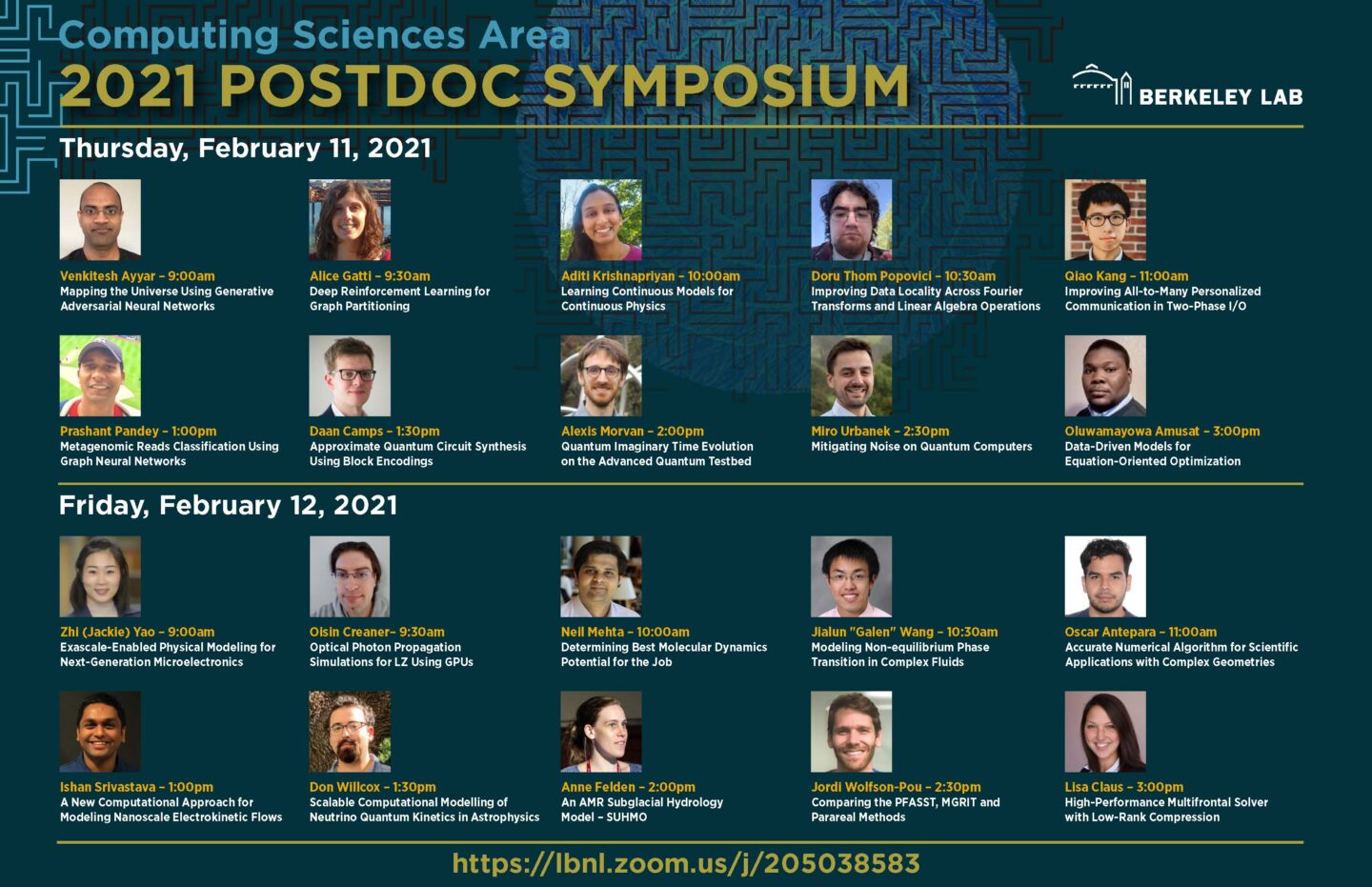Twenty postdoctoral research fellows presented their work in exascale computing, computational science, machine learning, quantum computing, data management and analysis, and much more at Berkeley Lab’s Computing Sciences Area 2021 Postdoc Symposium on February 11 and 12.
The symposium is designed to provide area postdocs with communications training, mentorship, and coaching sessions, plus an opportunity to present their research in a public forum. Following a workshop and dry run, participants gave 30-minute presentations, including 10 minutes for questions, about their research to the wider Lab community.
THURSDAY, FEB. 11
| 9:00 a.m. | Venkitesh Ayyar | Mapping the Universe Using Generative Adversarial Neural Networks |
| 9:30 a.m. | Alice Gatti | Deep Reinforcement Learning for Graph Partitioning |
| 10:00 a.m. | Aditi Krishnapriyan | Learning Continuous Models for Continuous Physics (Video to be released on publication of research.) |
| 10:30 a.m. | Doru Thom Popovici | Improving Data Locality Across Fourier Transforms and Linear Algebra Operations |
| 11:00 a.m. | Qiao Kang | Improving All-to-Many Personalized Communication in Two-Phase I/O |
| 1:00 p.m. | Prashant Pandey | Metagenomic Reads Classification Using Graph Neural Networks |
| 1:30 p.m. | Daan Camps | Approximate Quantum Circuit Synthesis Using Block Encodings |
| 2:00 p.m. | Alexis Morvan | Quantum Imaginary Time Evolution on the Advanced Quantum Testbed |
| 2:30 p.m. | Miro Urbanek | Mitigating Noise on Quantum Computers |
| 3:00 p.m. | Oluwamayowa Amusat | Data-Driven Models for Equation-Oriented Optimization |
FRIDAY, FEB. 12
| 9:00 a.m. | Zhi (Jackie) Yao | Exascale-Enabled Physical Modeling for Next-Generation Microelectronics |
| 9:30 a.m. | Oisin Creaner | Light Simulations for Dark Matter |
| 10:00 a.m. | Neil Mehta | Determining the Best Molecular Dynamics Potential for the Job |
| 10:30 a.m. | Jialun (Galen) Wang | Modeling Non-equilibrium Phase Transition in Complex Fluids |
| 11:00 a.m. | Oscar Antepara | Accurate Numerical Algorithm for Scientific Applications with Complex Geometries |
| 1:00 p.m. | Ishan Srivastava | A New Computational Approach for Modeling Nanoscale Electrokinetic Flows |
| 1:30 p.m. | Don Willcox | Scalable Computational Modeling of Neutrino Quantum Kinetics in Astrophysics |
| 2:00 p.m. | Anne Felden | An AMR Subglacial Hydrology Model – SUHMO |
| 2:30 p.m. | Jordi Wolfson-Pou | Comparing the PFASST, MGRIT and Parareal Methods |
| 3:00 p.m. | Lisa Claus | High-Performance Multifrontal Solver with Low-Rank Compression |
About Computing Sciences at Berkeley Lab
High performance computing plays a critical role in scientific discovery. Researchers increasingly rely on advances in computer science, mathematics, computational science, data science, and large-scale computing and networking to increase our understanding of ourselves, our planet, and our universe. Berkeley Lab's Computing Sciences Area researches, develops, and deploys new foundations, tools, and technologies to meet these needs and to advance research across a broad range of scientific disciplines.
Please be aware that this historical content might mention programs, people, and research that aren’t currently active at Berkeley Lab, links to web pages that don’t work anymore, or documents that aren’t available. We’ve preserved this information just the way it was, so that others can learn more about the past.


